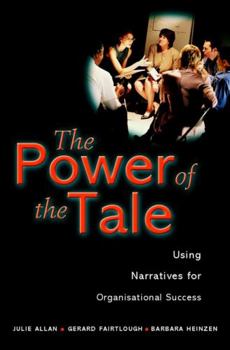The Power of the Tale: Using Narratives for Organisational Success
Select Format
Select Condition 
Book Overview
Eine der besten Lernmethoden für Einzelpersonen, Gruppen, Organisationen und auch Gesellschaften ist das Geschichtenerzählen.
"The Power of the Tale" beschreibt, wie man mit Geschichten und anderen Erzähltechniken komplexe Sachverhalte besser verständlich macht, besser miteinander kommuniziert und auch die persönliche und geschäftliche Effektivität steigern kann.
Geschichtenerzählen als Schlüssel zu mehr Erfolg im Unternehmen durch...
Format:Hardcover
Language:English
ISBN:047084227X
ISBN13:9780470842270
Release Date:March 2002
Publisher:Wiley
Length:320 Pages
Weight:1.30 lbs.
Dimensions:0.9" x 6.7" x 8.9"
Customer Reviews
2 ratings
A Good Read!
Published by Thriftbooks.com User , 21 years ago
If you think story-telling is just for little kids, three experts - psychologist Julie Allan, biochemist Gerard Fairtlough and consultant Barbara Heinzen - disagree. They have discovered significant value in story-telling within organizations. After briefly describing the multi-cultural history of stories and oral traditions, they dissect the purposes of story-telling, such as increasing rapport, appealing to the emotions and explaining situations. They use seven composite company case studies to demonstrate how stories can build truth and trust, promote learning, develop skills, break new ground and create scenarios you can use in planning the future. These well-intended examples tend to meander confusingly, but you'll get the point. The last section of the book is devoted to thinking about stories and their uses, an innovative subject that gets little general attention and is the real meat of the text. While the book is very informative and useful, it is not always clear about the purposes of particular stories. We from getAbstract found many helpful lessons about story-telling here, including, unfortunately, a demonstration of the need for sharp editing.
The subversive power of the tale ...
Published by Thriftbooks.com User , 22 years ago
This book has obviously been conceptualised as a primer. It provides a broad survey of findings in various fields, particularly psychology and to a lesser extent anthropology, philosophy and linguistics. In the treatment of its material it is very didactic: the language is straightforward and non-technical, themes and issues are gradually introduced and key messages are regularly revisited. 'The Power of the Tale' starts off rather inconspicuously with a short and very general presentation of the main themes of the book. Then it moves on to the central part, consisting of seven chapters in which the role of story-telling is highlighted in a range of different organisations: formal and informal, small and large, temporary and durable, business and non-business. Some of the settings are fictitious transpositions of the author's real-life experiences, others are existing and recognisable organisations. Thus we dwell consecutively in a maturing start-up company, a large car producer, an informal community of practice, Britain's National Health Service, a not-for-profit organisation in the cultural sector and a countrywide society. Each of these settings provides the backdrop for a different way of leveraging the art of story-telling: for building trust, for furthering personal and organisational learning, for dealing constructively with dilemmas, for spurring innovation and self-organisation, and for enriching the strategic conversation. Of course this book implicitly invites to be read as a story. From this vantage point, it reveals a number of interesting subtexts. To my mind, there are at least two protagonists playing a key role in the background of this narrative. First there is 'the stranger', or 'the outsider'. He can be an external or internal consultant, who joins a constituency and reanimates it with the power of story-telling. It can also be a full member of the organisation who, after having developed a certain level of proficiency in the discipline, takes her leave from her erstwhile peer group. This implicitly forces the insight upon us that stories by their very nature are subversive. The narrative paradigm constitutes a deep antithesis to the command-and-control approach which is still dominating many of our contemporary organisations. Stories are 'Fremdkörper', wayward entities that develop their own viral logic once they're out in the open. A commitment to introducing story-telling in an organisation, therefore, is a serious affair. It constitutes a leap of faith which over time literally might change the organisational dynamics beyond recognition. It seems that the capacity for story-telling can only lead a tenuous, unstable existence within the confines of organisations as we know them today. This brings us to the second mysterious protagonist: the 'senior manager' or the 'decision taker'. At first sight he seems conspicuously absent from the scene. But he is present enough, and in not a terribly flattering role, as a 'corporate






